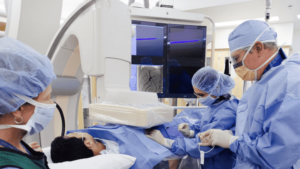An interventional radiologist can diagnose and treat various health conditions by using a specialized tool that is inserted through the blood vessels. This tool may be a needle, catheter, or wire. It is able to reach the location of the condition and provide detailed images of the organ. The patient may be sedated before the procedure, but general anesthesia is not usually required. Check on interventional radiologist in Houston

Another type of interventional radiologist uses heat to destroy tumors. This procedure is often used to treat cancerous tumors. An interventional radiologist places a small needle into the affected area and deploys energy that kills cancer cells while sparing healthy tissue. This treatment is especially helpful for patients with tumors that are too large or too complicated for surgery. It uses various types of energy, including heat and radiofrequency energy.
In addition to treating cancer and other serious diseases, interventional radiologists also perform procedures that improve blood circulation. Some of the procedures that an interventional radiologist may perform are: dilation of the arteries of the kidneys, treatment of high blood pressure, and elimination of symptoms caused by varicose veins. There are many other procedures that an interventional radiologist may use, depending on the patient’s health conditions and needs.
Interventional radiologists are board certified and have undergone extensive training in diagnostic and interventional radiology. They also have additional training in percutaneous radiological interventions, which uses guided imaging to treat various conditions in the body. Their training includes training in radiation safety, radiation physics, and biology. They also work collaboratively with the rest of the care team.
Interventional radiologists perform a variety of minimally invasive procedures that are guided by images and x-rays. These procedures have become the standard of care for many patients, including those with tumors, and can eliminate the need for surgery in many cases. In addition to performing these procedures, interventional radiologists also work closely with other doctors, including surgeons and radiologists.
The specialty of interventional radiology is growing rapidly. They specialize in the diagnosis and treatment of vascular and lymphatic system problems using minimally invasive techniques. Interventional procedures are a great alternative to open surgical procedures, with shorter recovery times, less pain, and less risk. Interventional radiologists use their expertise to guide small instruments through the blood vessels to diagnose and treat problems.
